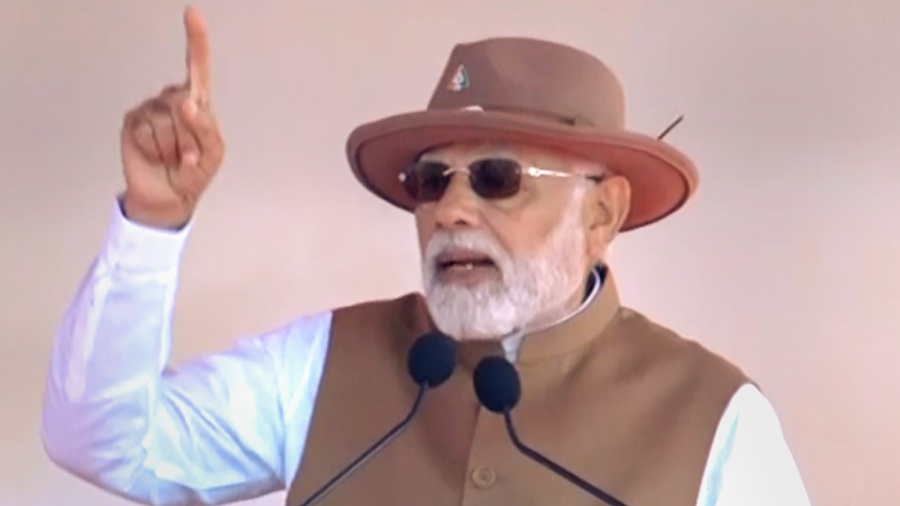In a veiled attack on Congress, Prime Minister Narendra Modi on Friday said his government in the last nine years has transformed the country from among 'fragile-five' to 'anti-fragile' by re-imagining and re-inventing every element of governance.
Speaking at the Economic Times Global Business Summit 2023, Modi highlighted various achievements of his government in several sectors, like road construction, expansion of metro train network, laying railway lines, and increasing number of airports.
The prime minister also asked global investors to participate in India growth story saying that in return the country guarantees returns.
"When you associate with India's growth journey, India gives you guarantee of growth," he said, stressing, "India's prosperity is the world's prosperity and India's growth is the world's growth".
The prime minister also took a dig on "opinion makers", saying: "In our country, most of the opinion makers are busy in relaunch, re-relaunch of the same 'product' every six months. And even in this relaunch, they do not re-imagine".
The theme of the ET Global Summit is 'Reimagine Business; Reimagine The World'.
"India has shown the world what it means to be anti-fragile. Where earlier there used to be the talk of 'fragile five', now India is being identified with anti-fragile. India has shown the world how to convert calamities into opportunities," he said.
'Fragile five' was a term used in 2013 to describe Brazil, Indonesia, India, South Africa and Turkey as investors pulled out funds from the emerging market economies to invest in developed markets anticipating higher yields.
Modi recalled the tough times for the country's reputation due to scams, the poor being deprived due to corruption, the interests of the youth being sacrificed on the altar of the dynasty, and nepotism and policy paralysis delaying projects.
"That's why we decided to re-imagine, re-invent every single element of governance. We re-imagined how the government can improve welfare delivery to empower the poor. We re-imagined how the government can create infrastructure in a more efficient way. We re-imagined what kind of relationship the government should have with the citizens of the country," he said.
The prime minister elaborated on re-imagining welfare delivery and talked about the delivery of bank accounts, loans, housing, property rights, toilets, electricity, and clean cooking fuel.
He further said even India's first Prime Minster Jawaharlal Nehru knew that when every Indian will have a toilet facility, it will mean that India has reached a new height of development.
Modi said that 10 crore toilets were constructed after 2014, taking sanitation coverage from below 40 per cent to 100 per cent in rural areas.
Modi said his government has so far transferred Rs 28 lakh crore through Direct Benefit Transfer (DBT) under different welfare schemes.
Apparently referring to previous Congress-led governments, he said even in development of infrastructure, political ambition was given precedence over the country's needs and the power of infrastructure was not appreciated.
"We stopped the practice of viewing infrastructure in silos and re-imagined infrastructure building as a grand strategy. Today, highways are being built in India at a speed of 38 kilometres per day and more than 5 kilometres of rail lines are being laid every day. Our port capacity is going to reach 3,000 MTPA in the coming 2 years," Modi said.
Observing the prevalent 'mai-baap' culture of the governments of the past, he pointed out that those who ruled behaved like "masters" among citizens of their own country.
He further stressed that it is not to be confused with 'parivarvad' and 'bhai-bhateejavad' (nepotism). He said that the situation was such that the government looked at its citizens with suspicion no matter what they did, and citizens had to take permission from the government before doing anything.
It led to an atmosphere of mutual distrust and suspicion between the government and the citizens, he said.
Modi said that even though old mistakes from the 1990s were rectified due to compulsion, the old 'mai-baap' mentality did not disappear completely.
The prime minister further said that after 2014, the 'government-first' mentality was re-imagined as a 'people-first' approach and the government worked on the principle of trusting its citizens.
Except for the headline, this story has not been edited by The Telegraph Online staff and has been published from a syndicated feed.











